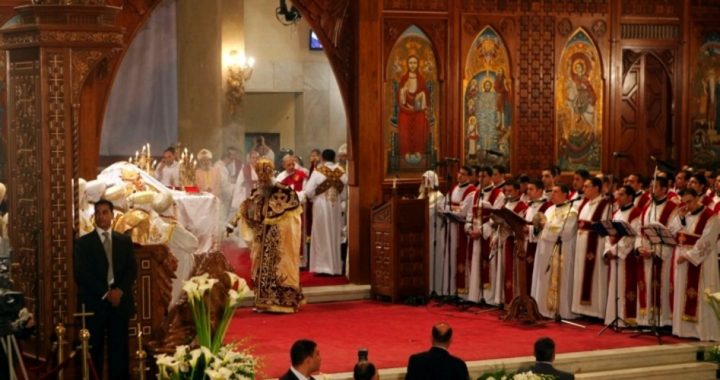
Reports from Egypt indicate that attacks against Egypt’s Coptic Christians have increased since former President Mohamed Morsi was forced from power on July 3. Copts claim that they have been targeted by Islamic radicals as retribution for their opposition to Morsi, who was backed by the Muslim Brotherhood.
Fox News, citing a report in the Financial Times, reported that nine Christians have recently been killed in Egypt, including a Coptic priest, Father Mina Aboud Sharween, in the Sinai Peninsula. Following Sharween’s murder, many other Coptic clergy have gone into hiding.
Magdy Lamei, identified as a Christian salesman, was also found murdered in the Sinai on July 4, a few days after he was kidnapped and held for a ransom equivalent to $70,000.
The Times noted that acts of violence against Copts have been reported ever since Morsi and the Muslim Brotherhood took power last year.
Furthermore, noted the report, more than a dozen Christian churches have been attacked and damaged and Coptic-owned businesses have been vandalized.
Fox also reported a statement made by Jordan Sekulow — son of Jay Sekulow, the founder of the American Center for Law and Justice (ACLJ) — executive director of the Washington, D.C.-based ACLJ, who said, “The Muslim Brotherhood’s allegation that Coptic Christians in Egypt are in some way responsible for the coup that ousted former President Morsi reeks of ignorance and sectarian intolerance.”
Sekulow noted that the Brotherhood’s claim that Copts are responsible for Morsi’s fall from power “is not only factually inaccurate, but not even possible. One religious minority simply does not overthrow an Islamic government in a predominantly Muslim country.”
Sekulow noted that the Muslim Brotherhood fails to admit that it was Muslims — who comprise a majority of the population in Egypt—who led the movement to remove Morsi.
Though the council that declared Morsi unseated on July 3 did include the Coptic Pope Tawadros II, he was but one of four members. The other three, Defense Minister Abdul Fatah al-Sisi, opposition leader Mohamed El Baradei, and the Grand Imam of al Azhar, Ahmed el-Tayeb, are all — like Morsi — Sunni Muslims.
A report published in the Christian Post cited a statement made to the MidEast Christian News by Dr. Nabil Abdel Fattah, a political analyst and researcher specializing in Islamic groups’ affairs for the Al-Ahram Center for Political and Strategic Studies, who said that Christians in Egypt are being intimidated by Islamic extremists, who have incited “sectarian attacks by targeting the country’s Coptic population in order to spark divisions in Egypt based on religious affiliations.”
In the interview with MidEast Christian News, Abdel Fattah said:
The sectarian attacks against Copts are one of the controversial strategies pursued by Islamic extremist currents, in their bid to intimidate Christians. Whether it is out of revenge for participating in the political process or as a result of the radical ideologies these groups have, [they are] creating a state of anarchy and insecurity across the Egyptian streets, turning current issues into a sectarian conflict to mobilize neutral citizens against their fellow countrymen.
Fattah cited threats made by the Muslim Brotherhood’s leaders — which stated that the terrorist attacks in Sinai will stop only if Morsi returns to power — as proof that the Brotherhood is involved in the violence taking place in Sinai.
The Muslim Brotherhood’s credo is, “Allah is our objective; the Quran is our law, the Prophet is our leader; Jihad is our way; and death for the sake of Allah is the highest of our aspirations.”
A Reuters report published by the Jerusalam Post quoted reactions from Christians in Egypt immediately following Morsi’s ouster. The general view was one of much-guarded optimism. One of those interviewed was Christian lawyer Peter Naggar, who had joined a celebration in Cairo’s Tahrir Square, and said, prematurely: “This is the real Egyptian revolution. The people stood up against Islamism. This is the end of political Islamism.”
Another interviewee, Roman Gouda, who was visiting Egypt’s biggest cathedral in Cairo’s Abbasiya district, said more realistically, “It’s an improvement that Morsi is gone but I am still not entirely relaxed.” Gouda’s friend Amir Habib told the reporter, “I am worried because the Brotherhood keep protesting.”
The report in the Post noted that Copts are pleased that Egypt’s new interim Cabinet, which will rule until elections are held, contains three Christians, including liberal Mounir Fakhry Abdel Nour in the key investment ministry post. Morsi’s Cabinet had just one Christian, who served as minister for scientific research.
“This is a government for all Egyptians,” said Naggar. “They got appointed because they are competent.”
The report also noted that though many Christians, such as Muslim Egyptians, disliked the brutality and corruption that was rampart during the rule of the former Egyptian President Hosni Mubarak (1981-2011), they felt safer under Mubarak, who jailed Islamist extremists.
Both Mubarak and Morsi are Sunni Muslims with ties to the West and the non-Muslim world. Mubarak’s wife is the daughter of an Egyptian father and a Welsh mother. While in the Egyptian air force, Mubarak underwent training in Soviet aviation schools. Morsi received his Ph.D. from the University of Southern California, and two of his children were born in California and are U.S. citizens.
The current plight of Christians in Egypt mirrors what has happened in other Muslim nations when secularized, Western-leaning leaders — autocrats though they may have been — provided a fair degree of tolerance to Christians in their countries. The Shah in Iran, Saddam Hussein in Iraq, and Mubarak in Egypt fell into that category. However, each time the leader was removed from power, radical Islamists gained either total power or increased influence and persecuted Christians to the point that many fled each country.
Photo of Coptic Easter Mass at St. Mark’s Cathedral in Cairo: AP Images
Related articles:
Egypt’s Coptic Christians Brace for Life Under the Muslim Brotherhood
Is the Muslim Brotherhood Plotting “Arab Springs” for Other Nations?



